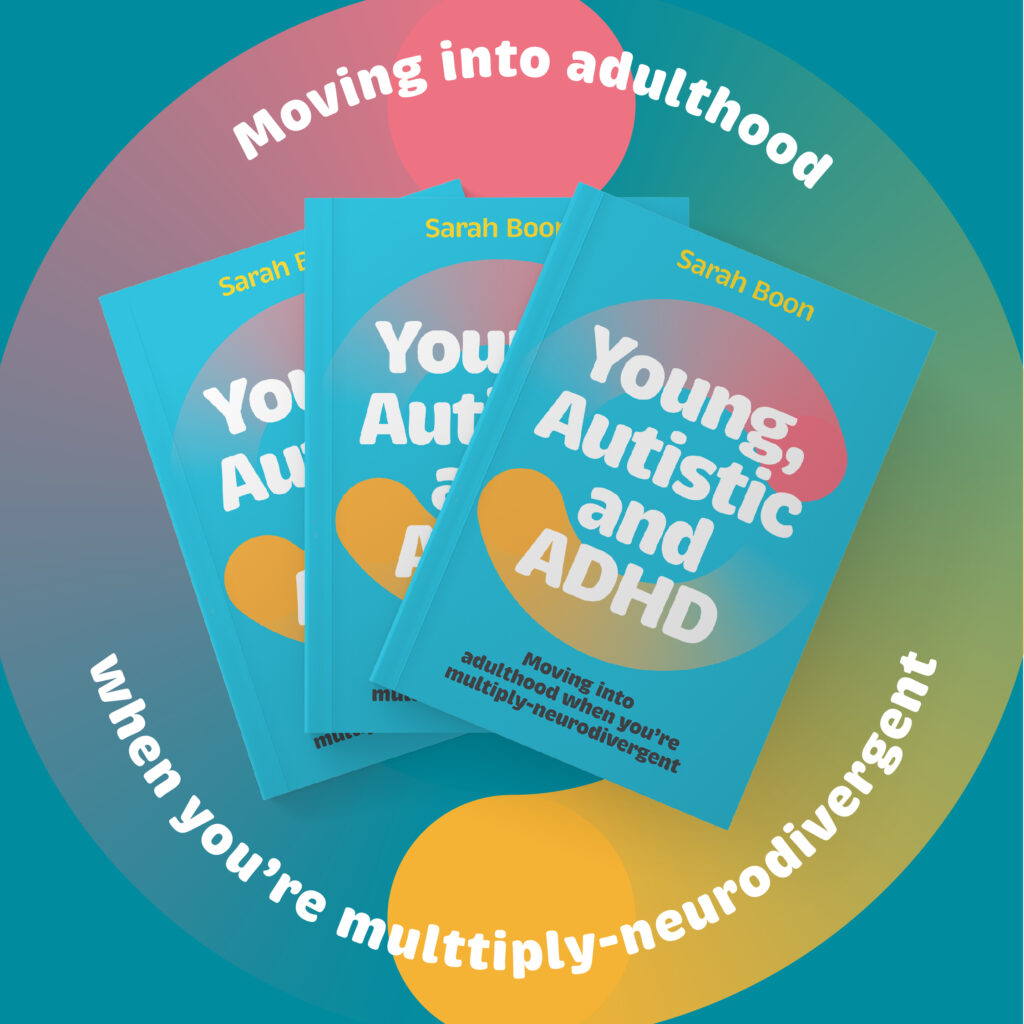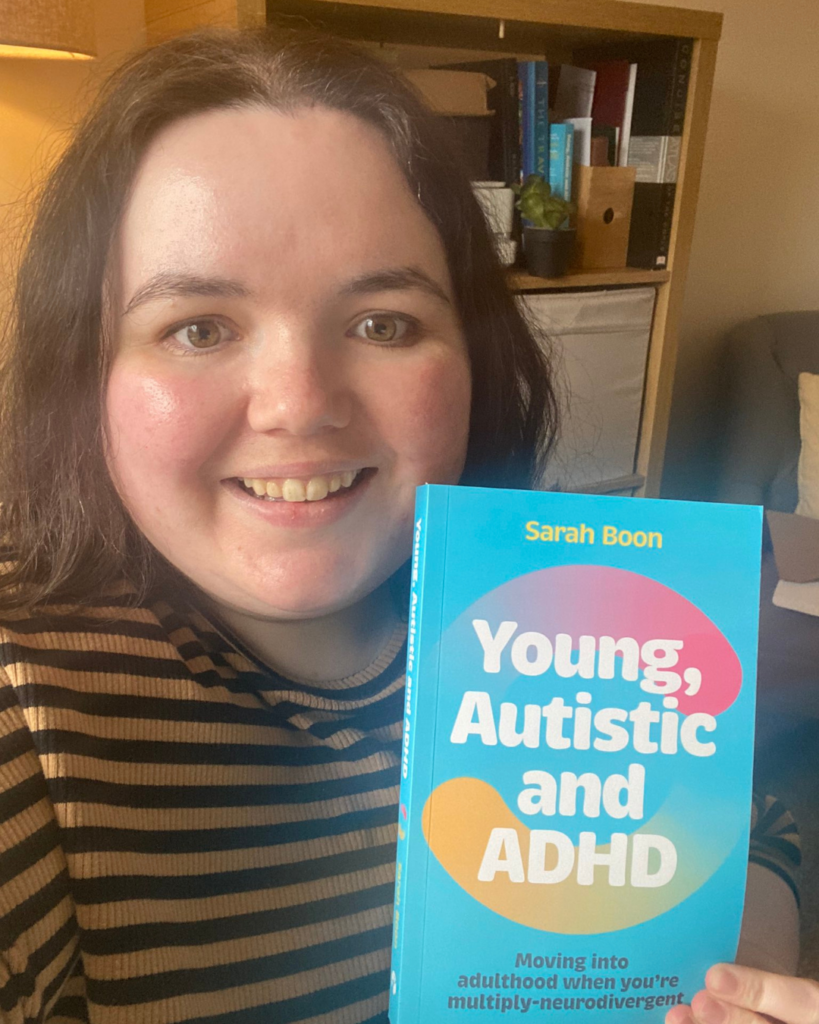
After the recent release of her book Young, Autistic and ADHD, we got a chance to ask Sarah Boon a few questions about writing the book, navigating life as a multiply-neurodivergent person, and so much more.
Can you tell us a little bit about this book and how you came to write it?
Yes, the idea for Young, Autistic and ADHD came after discovering I was an autistic ADHDer in my mid-twenties. While I was learning more about autism and ADHD (and what that meant for me) I realised that my early adult years could have gone a lot smoother if I was aware of my neurodivergence back then and had the knowledge I now have. The book is all the things I wish I could have told younger Sarah about navigating life as an autistic ADHDer that would have made life easier, and not falling into pitfalls that could have been avoided. I wrote this book so that the next generation of autistic ADHDers don’t have to struggle like many of us who came before them have. It’s about making sure young people have access to the right tools and knowledge about adulthood as a neurodivergent person.
Now that the book is out in the world, who do you hope reads it?
The book is primarily for Young Autistic ADHDers (as the titles suggest), and is a suitable read for young autistic ADHDers who are 16+. That is who I had in mind when writing this book. However, both neurodivergent and neurotypical people can gain something from this book. The book covers topics such as education and the workplace for young autistic ADHDers, so I really hope colleges, universities and employers who are seeking to be more inclusive of neurodivergent people read this too! I’ve already had feedback on how one workplace has adjusted their practices from reading my book.
Also I hope family and friends of young autistic ADHDers read this book too, so they can better understand and support us.
Did you receive your diagnosis for Autism and ADHD at the same time?

I received them at different times. My autism diagnosis first and then my ADHD diagnosis a year later. I didn’t even think about ADHD for myself until I spoke with other autistic people who were also ADHDers. As I am both, neither my autism or ADHD presents in a typical way, so it took understanding what autism and ADHD are like together (sometimes referred to as AuDHD online) for me to relate and identify ADHD within myself.
Do you think diagnoses and ‘labels’ are a help or hindrance?
I do think having words to describe our experiences is useful. On a personal level, I needed the right language (or labels) to describe my differences so I didn’t feel so broken or like I was a failed human being. Knowing there is a reason for why I am different from most other people is incredibly helpful to understanding myself. Also, I found that not having the right ‘label’ meant others would assign often cruel and harsher labels to me for being different, rather than autism and ADHD.
Over time though, I have come to understand that a diagnosis is more based on professionals’ external observations of us, and not our personal experiences of autism and ADHD. I was misdiagnosed before receiving the correct diagnosis. So although some of us may need to get a diagnosis to access specific support, that is not what makes us autistic ADHDers. We have the same brains before and after a diagnosis. A diagnosis is a process which seeks to formally recognise autism and ADHD, and can be a starting point for some to better understand ourselves. However, I believe it should be a very individual choice if we decide to be assessed and seek a diagnosis or not. In the book I talk about some of the pros and cons about diagnosis for autism and ADHD, so people can make a more informed choice about what is the best option for themselves.
As a neurodivergent person, what is your writing process like? How did you find the experience of working with an editor and going through the publishing process?
It wasn’t straight forward, and I did rely on technology such as dictation software and text to speech to write my book. I also think deciding the book’s structure and chapters before I started writing was super helpful, as I can find it difficult to structure my ideas in a coherent way for readers without this. Although I will admit, I did keep changing my mind about the best way and order to communicate my ideas within the chapters themselves while writing. There was a lot of copying, pasting, and then moving paragraphs within the chapters due to how my brain processes ideas. It meant it took a lot longer for me to finish writing the book than anticipated, but it was important to get it as good as it could be before putting it out into the world.
As I am also dyslexic, I often make typos without realising and when proofreading my own work, my ADHD can mean I often struggle to pick up my own writing mistakes. I wasn’t surprised that during the editing, the vast majority of the changes were grammar and typos. If anything, seeing how the editor corrected all the grammar and typos made me feel confident that the manuscript had been thoroughly checked as part of the publishing process.
With so many people being diagnosed with ADHD and Autism, it has been referred to in parts of the media as a ‘trend’. How does this feel for you and what would you say to those who call it a trend?
We have always existed, it’s only just now the world is catching up about how many of us are autistic ADHDers. Many people who are part of marginalised communities or groups have historically not been recognised as neurodivergent at all until recently, and there is still under-recognition. I think it is important to remember that the DSM didn’t even allow a dual diagnosis of autism and ADHD until 2013 as well. I suspect that some autistic ADHDers did not get recognised as either due to not fitting neatly into formal definitions of autism and ADHD. Also, many neurodivergent people were institutionalised (and some still are). They may have received other labels or diagnoses that weren’t autism or ADHD.
We are becoming more visible and the media have weaponised this into click-bait articles about autism and ADHD being ‘trends’. I do question if the people claiming it’s a ‘trend’ in the media genuinely believe this? Or are just looking to generate outrage to drive up their own readership numbers. If I am being honest, I don’t have much emotional space anymore for people who go on about autism and ADHD being a ‘trend’. What I know is that If they had to spend a day living with my brain, they would be taking back their claims that they are both ‘trends’.
You have a large Twitter following and it seems really found your voice and your people there. What has the online community and platform meant to you?
It’s nice to be able to connect with people who share some similar experiences to myself. Being neurodivergent, you don’t always get that opportunity in day to day life. However, online spaces means you can find others who understand more easily. Social media is still a place where you’ll experience trolls and you won’t get on with everybody who is on there. However, even with the bad things on social media, I have still made connections with some other neurodivergent people who I really appreciate.
For anyone reading this who isn’t sure if this book is for them, what would you say?
Give it a try! Sometimes you don’t know if a book is for you until you get into it. Also the book does not have to be read chronologically, it may be that certain chapters of the book are more relevant for you. So you could always start with reading the parts of the book that feel the most relevant for yourself first to see if it is for you.
For anyone reading this who thinks they may be neurodivergent but isn’t sure where to begin learning more about themselves, do you have any advice?
Take your time to process your thoughts, It can be a lot to take in when you discover you’re neurodivergent. I’d also say read as much as you can about it too. I remember binge reading so many books about autism and ADHD when I first discovered I was neurodivergent, and this was definitely a good starting point for understanding myself better.
Thank you Sarah, it’s been a pleasure speaking with you. Young, Autistic and ADHD is out now!

Sarah is a late-discovered autistic ADHDer who has a Masters in the Psychology of Education and a PgCert in Autism. Sarah provides consultancy on autism, ADHD, dyslexia, and neurodiversity. Sarah also has professional experience, academic knowledge and personal experiences of both autism and ADHD alongside sharing her thoughts about neurodiversity on her blog autisticallysarah.com.